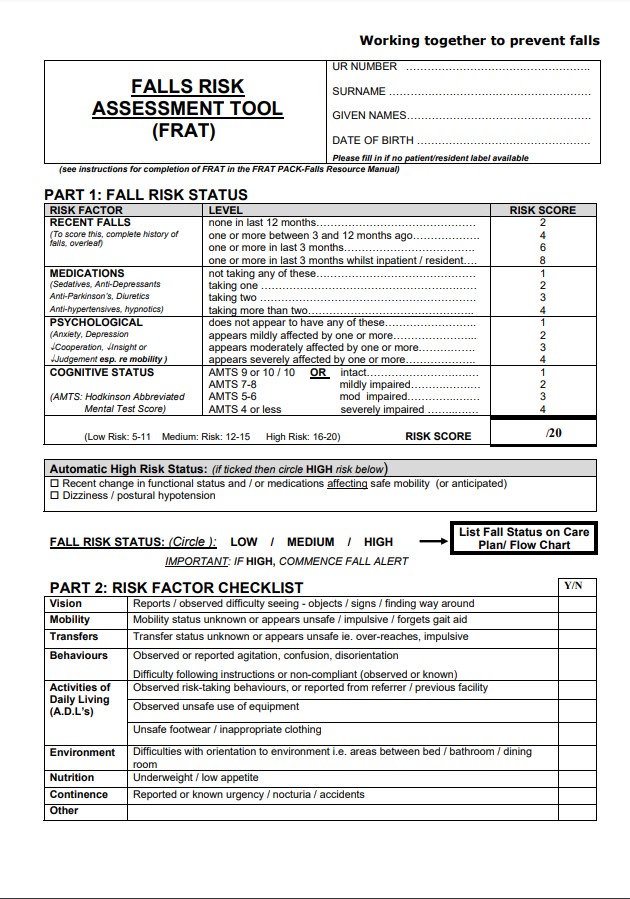9 Easy Facts About Dementia Fall Risk Described
9 Easy Facts About Dementia Fall Risk Described
Blog Article
Dementia Fall Risk Things To Know Before You Buy
Table of ContentsNot known Facts About Dementia Fall RiskSome Known Details About Dementia Fall Risk The Single Strategy To Use For Dementia Fall RiskThe Best Guide To Dementia Fall RiskThe Main Principles Of Dementia Fall Risk
Evaluating autumn threat assists the entire healthcare group create a more secure environment for each and every individual. Make certain that there is an assigned location in your clinical charting system where staff can document/reference scores and document pertinent notes associated with drop avoidance. The Johns Hopkins Fall Risk Analysis Device is just one of many tools your staff can use to assist stop unfavorable clinical occasions.Person drops in healthcare facilities are usual and debilitating negative events that continue regardless of years of effort to reduce them. Improving interaction throughout the analyzing registered nurse, care team, client, and client's most included good friends and household might enhance loss prevention initiatives. A team at Brigham and Women's Hospital in Boston, Massachusetts, looked for to establish a standard fall prevention program that centered around boosted communication and patient and family engagement.

The technology team emphasized that effective implementation relies on individual and staff buy-in, assimilation of the program into existing workflows, and integrity to program processes. The group noted that they are grappling with how to ensure connection in program execution during durations of dilemma. During the COVID-19 pandemic, as an example, an increase in inpatient drops was connected with restrictions in individual involvement along with constraints on visitation.
Little Known Questions About Dementia Fall Risk.
These incidents are normally taken into consideration avoidable. To carry out the intervention, organizations need the following: Accessibility to Autumn pointers resources Autumn TIPS training and retraining for nursing and non-nursing team, including new nurses Nursing operations that permit for client and household interaction to perform the falls analysis, ensure usage of the avoidance strategy, and carry out patient-level audits.
The outcomes can be extremely harmful, typically speeding up client decline and causing longer healthcare facility remains. One research study estimated stays increased an additional 12 in-patient days after a patient loss. The Loss TIPS Program is based on engaging patients and their family/loved ones throughout 3 primary processes: assessment, individualized preventative interventions, and bookkeeping to make certain that individuals are participated in the three-step loss prevention procedure.
The person evaluation is based upon the Morse Autumn Scale, which is a confirmed fall risk evaluation device for in-patient hospital setups. The range consists of the six most typical factors individuals in medical facilities drop: the client autumn background, risky conditions (including polypharmacy), use IVs and various other outside devices, mental condition, gait, and mobility.
Each threat aspect relate to one or even more workable evidence-based interventions. The nurse creates a plan that incorporates the treatments and is visible to the care group, person, and family members on a laminated poster or printed visual aid. Nurses create the plan while consulting with the client and the person's household.
Examine This Report on Dementia Fall Risk
The poster serves as an interaction device with other participants of the patient's treatment group. Dementia Fall Risk. The audit part of the program consists of examining the individual's understanding of their danger variables and avoidance plan at the unit and healthcare facility levels. Nurse champs perform at the very least five individual meetings a month with people and their households to look for understanding of the fall prevention plan

An estimated 30% of these drops lead to injuries, which can vary in seriousness. Unlike other damaging occasions their explanation that need a standardized clinical feedback, loss prevention depends extremely on the needs of the person. Consisting of the input of individuals who understand the patient best enables higher customization. This technique has confirmed to be a lot more efficient than fall avoidance programs that are based primarily on the manufacturing of a danger rating and/or are not customizable.
What Does Dementia Fall Risk Do?

Based on bookkeeping outcomes, one website had 86% conformity and 2 sites had more than 95% compliance. A cost-benefit analysis of the Fall pointers program in eight medical facilities approximated that the program expense $0.88 per client to execute and resulted in cost savings of $8,500 per 1000 patient-days in direct costs associated with the avoidance of 567 tips over three years and 8 months.
According to the innovation team, companies thinking about implementing the program must conduct a readiness assessment and falls prevention voids evaluation. 8 Furthermore, organizations ought to ensure the required facilities and process for execution and develop an execution strategy. If one exists, the company's Fall Prevention Task Force must be associated with planning.
Fascination About Dementia Fall Risk
To begin, companies must guarantee conclusion of training modules by registered nurses and nursing assistants - Dementia Fall Risk. Health center staff must evaluate, based upon the needs of a hospital, whether to use an electronic health and wellness record hard copy or paper version of the loss prevention strategy. Executing groups need to recruit and educate nurse champions and develop Resources processes for auditing and coverage on fall data
Personnel need to be associated with the process of revamping the process to involve people and family in the assessment and avoidance strategy procedure. Equipment must be in place to ensure that units can understand why a fall occurred and remediate the cause. More specifically, registered nurses need to have networks to provide recurring comments to both staff and device management so they can readjust and enhance loss avoidance operations and connect systemic troubles.
Report this page